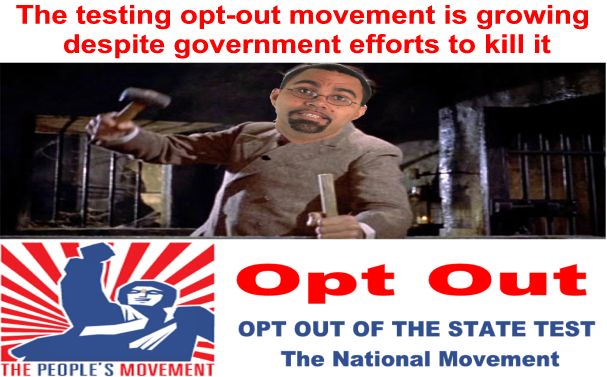A Status Update on All Those Testing Opt-Outs
Many families this year have chosen to boycott state-mandated assessments as an act of civil disobedience, and the consequences are—and continue to be—complicated.

With state testing season wrapping up, the decision by some families to skip the K-12 exams in protest this spring has once again sparked widespread discussion—and news coverage around the country.
In San Diego, for example, teachers handed out fliers to parents earlier this month informing them of the right to keep their children from taking state tests, the San Diego Union-Tribune reported. A local teachers’ union official cited worries about the amount of testing, as well as its relevance and accuracy for gauging student learning.
In Tennessee, where the opt-out movement appeared to be gaining steam this spring, as reported by Chalkbeat Tennessee and other outlets, it became a moot point after the bulk of state testing for grades three through eight was canceled altogether in April. That decision followed a series of problems with the administration of the assessments for English-language arts and math.
The actions come as concerns have risen about the volume of standardized testing at the K-12 level, its perceived impact on instruction, and its use in evaluating schools, students, and teachers.
It will likely be some time before the volume of students skipping state exams this year is clear, and whether the number is higher or lower than in spring 2015, when the issue hit the national education radar in a big way.
In the meantime, debates over the wisdom of having students skip the exams continue to rage.
“Many opt-out leaders see what they’re doing as an act of civil disobedience,” said Robert Schaeffer of the advocacy group FairTest, during an Education Writers Association seminar in Los Angeles earlier this year.
Schaeffer, who has worked closely with opt-out activists around the country, cautioned that parents and others promoting the cause do not speak with a uniform voice, nor do their agendas necessarily align.
“The opt-out movement needs to be understood as not a top-down thing, but a genuine grassroots, bottom-up movement in which different people in different states have different agendas,” said Schaeffer. He sees opting out as a powerful strategy to build pressure to reduce testing, remove “high stakes” from assessments, and “create space for the development of new and better forms of assessment and accountability.”
Chris Stewart, the director of outreach and external affairs for Education Post, has sharply criticized the push for families to sit out state tests.
“You can’t close the achievement gap by erasing the data,” Stewart said at the Education Writers Association event, arguing that opting out especially hurts students of color. He describes the efforts as reflecting an alliance of “unions, The Debate Over Opting Out of State Testing Continues - The Atlantic:


